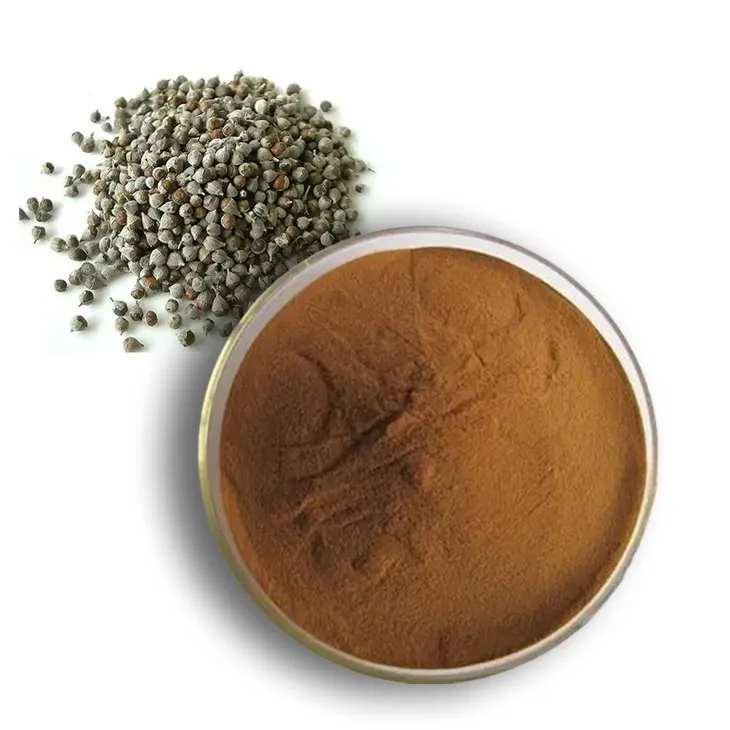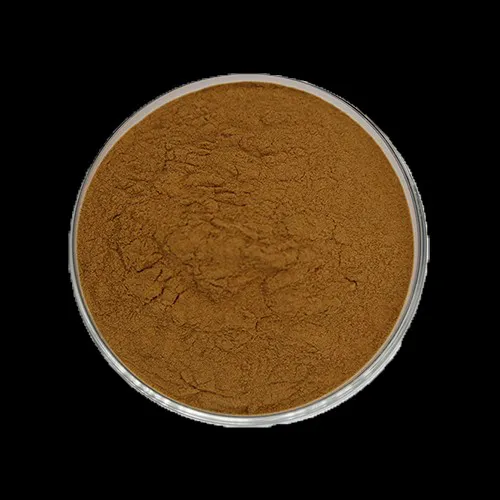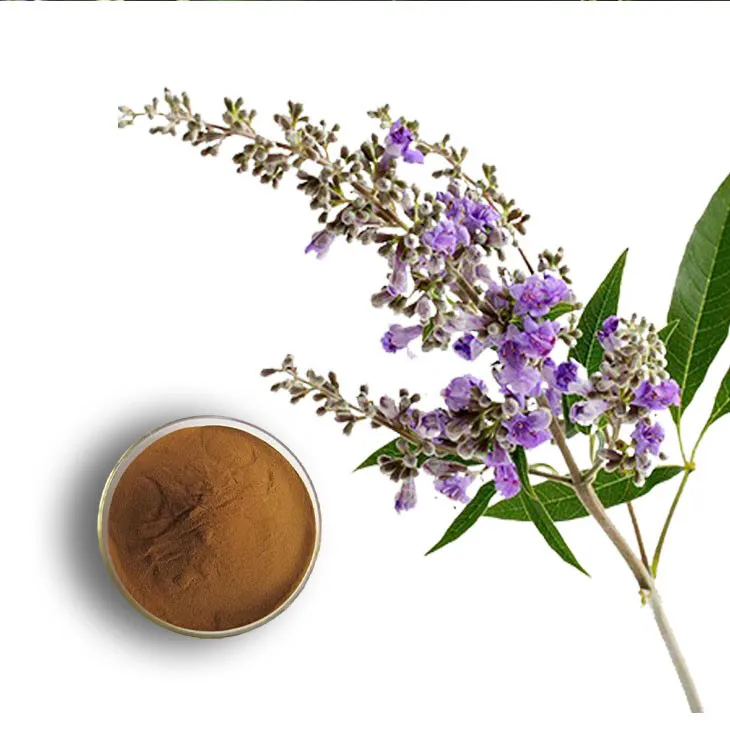- 0086-571-85302990
- sales@greenskybio.com
The Best Sources of Natural Chaste Berry Extract.
2024-11-30

Introduction
Chaste Berry Extract has been gaining significant attention in the world of natural remedies. Derived from the chaste tree (Vitex agnus - castus), this extract is known for its potential health benefits. Understanding the best natural sources of Chaste Berry Extract is crucial for those interested in harnessing its power. This article aims to provide a comprehensive exploration of these sources, delving into their unique properties and associated benefits.

1. The Chaste Tree - A Primary Source
The chaste tree itself is the most obvious and primary source of Chaste Berry Extract. Vitex agnus - castus is native to the Mediterranean region and parts of Asia and has been used in traditional medicine for centuries.
1.1 Growth and Cultivation
- The chaste tree thrives in warm, sunny climates. It can tolerate a variety of soil types but generally prefers well - drained soil. - In cultivation, it is important to provide adequate space for the tree to grow, as it can reach a height of up to 20 feet.
1.2 Properties of the Berries
- The berries of the chaste tree are small, about the size of a peppercorn. They start off green and turn black as they mature. - These berries contain a variety of active compounds, including flavonoids, iridoids, and diterpenes. These compounds are believed to be responsible for the extract's potential health - promoting effects.
1.3 Benefits Associated with Chaste Tree - Derived Extract
- Hormonal Balance: One of the most well - known benefits is its potential to help regulate hormonal imbalances in women. It may be beneficial for those with premenstrual syndrome (PMS) or irregular menstrual cycles. - Fertility Support: Some studies suggest that chaste berry extract may have a positive impact on female fertility by influencing the pituitary gland and hormonal regulation related to ovulation. - Breast Health: There is also some evidence to suggest that it may be helpful in maintaining breast health, although more research is needed in this area.

2. Organic Farming and Chaste Berry Extract
Organic farming practices play an important role in obtaining high - quality chaste berry extract.
2.1 Advantages of Organic - Grown Chaste Berries
- Purity: Organic farming reduces the risk of chemical contamination. Since chaste berry extract is often used for its natural health benefits, purity is of utmost importance. - Sustainability: Organic farms are more sustainable in the long run. They promote soil health, biodiversity, and the overall well - being of the ecosystem where the chaste trees are grown. - Nutrient - Richness: Organic - grown chaste berries may have a higher nutrient content. This is because organic farming methods often focus on building healthy soil, which in turn can lead to more nutritious plants.
2.2 Certification and Standards
- Look for chaste berry extract products that are certified organic. In the United States, the USDA organic certification is a well - recognized standard. - Certification ensures that the farming practices used to grow the chaste trees meet strict organic requirements, including restrictions on the use of synthetic pesticides, fertilizers, and genetically modified organisms (GMOs).

3. Wild - Harvested Chaste Berries
Wild - harvested chaste berries can also be a valuable source of extract, although they come with their own set of considerations.
3.1 Sustainability Concerns
- It is essential to ensure that wild - harvesting is done in a sustainable manner. Over - harvesting can deplete natural populations of the chaste tree. - Some regions have regulations in place to protect wild chaste tree populations, and it is important to abide by these rules.
3.2 Quality and Purity
- While wild - harvested chaste berries may offer a more "natural" source, they also need to be carefully processed to ensure quality and purity. - There is a risk of contamination from other plants or environmental factors, so proper cleaning and extraction methods are crucial.
3.3 Traditional Knowledge and Use
- In some traditional cultures, wild - harvested chaste berries have been used for centuries. This traditional knowledge can provide insights into the potential benefits and uses of the extract. - However, it is important to combine this traditional knowledge with modern scientific research to fully understand the properties and effects of wild - harvested chaste berry extract.
4. Chaste Berry Extract from Different Geographical Regions
The geographical origin of chaste berries can influence the quality and properties of the extract.
4.1 Mediterranean Region
- As the native region of the chaste tree, the Mediterranean area offers chaste berries with unique characteristics. - The climate and soil conditions in this region may contribute to a higher concentration of certain active compounds in the berries. - Extracts from Mediterranean - sourced chaste berries may have a long history of traditional use in local medicine, which adds to their allure.
4.2 Asian Origins
- In Asia, where the chaste tree also grows, the berries may have slightly different properties due to differences in climate, soil, and genetic factors. - Some Asian traditional medicine systems have incorporated chaste berry extract in their remedies, and research is ongoing to explore the specific benefits associated with Asian - sourced extract.
5. Selecting High - Quality Chaste Berry Extract Products
When choosing a chaste berry extract product, there are several factors to consider.
5.1 Ingredient Sourcing
- Look for products that clearly state the source of their chaste berries. Whether it is from a specific region, organically grown, or wild - harvested should be disclosed. - Transparency in ingredient sourcing is a sign of a high - quality product.
5.2 Extraction Methods
- The method used to extract the active compounds from the chaste berries can impact the quality of the extract. - Solvent - based extraction and supercritical CO2 extraction are two common methods. Supercritical CO2 extraction is often considered a more advanced and cleaner method as it does not leave behind solvent residues.
5.3 Product Testing and Certification
- Reputable chaste berry extract products should undergo testing for purity, potency, and safety. - Look for products that are third - party tested and have relevant certifications, such as Good Manufacturing Practice (GMP) certification.
6. Conclusion
Chaste berry extract has the potential to offer a range of health benefits, and understanding the best natural sources is key to maximizing its effectiveness. Whether it is sourced from the chaste tree itself, through organic farming, wild - harvesting, or from different geographical regions, each source has its own unique properties and considerations. By carefully selecting high - quality products that are sourced transparently and produced using reliable extraction methods, consumers can make the most of the power of chaste berry extract in the realm of natural remedies.
FAQ:
What are the main natural sources of chaste berry extract?
The main natural source of chaste berry extract is the fruit of the chaste tree (Vitex agnus - castus). This tree is native to the Mediterranean region and parts of Asia and Africa. The berries are harvested and processed to obtain the extract.
What are the unique properties of chaste berry extract from different sources?
Chaste berry extract from the chaste tree has hormonal - modulating properties. It may help regulate the menstrual cycle in women by influencing the pituitary gland. Different sources may vary slightly in their chemical composition, but overall, it contains compounds such as flavonoids, iridoids, and diterpenoids that contribute to its beneficial effects.
How can the benefits of chaste berry extract from natural sources be maximized?
To maximize the benefits, it's important to ensure the quality of the extract. Look for extracts that are sourced from organically grown chaste trees. Also, following the recommended dosage is crucial. It can be consumed in the form of supplements or tinctures, and in some cases, as part of herbal blends. However, it's advisable to consult a healthcare provider before starting any new supplement regimen.
Are there any potential side effects associated with chaste berry extract from natural sources?
Some people may experience mild side effects such as gastrointestinal upset, headache, or acne - like skin eruptions. However, these are relatively rare. Pregnant and breastfeeding women should avoid using chaste berry extract as it may affect hormonal balance.
How is chaste berry extract from natural sources processed?
The berries are typically dried first. Then, they can be ground into a powder and further processed using solvents such as ethanol or water to extract the active compounds. The resulting liquid is then concentrated to form the extract, which can be further purified if necessary.
Related literature
- The Benefits of Chaste Berry Extract: A Review of Natural Sources"
- "Chaste Berry Extract: Uncovering the Properties of Different Natural Origins"
- "Processing and Quality Control of Natural Chaste Berry Extract"
- ▶ Hesperidin
- ▶ citrus bioflavonoids
- ▶ plant extract
- ▶ lycopene
- ▶ Diosmin
- ▶ Grape seed extract
- ▶ Sea buckthorn Juice Powder
- ▶ Beetroot powder
- ▶ Hops Extract
- ▶ Artichoke Extract
- ▶ Reishi mushroom extract
- ▶ Astaxanthin
- ▶ Green Tea Extract
- ▶ Curcumin Extract
- ▶ Horse Chestnut Extract
- ▶ Other Problems
- ▶ Boswellia Serrata Extract
- ▶ Resveratrol Extract
- ▶ Marigold Extract
- ▶ Grape Leaf Extract
- ▶ blog3
- ▶ blog4
-
The most highly - praised ivy extract.
2024-11-30
-
100% Pure Natural Mulberry Leaf Extract.
2024-11-30
-
100% Pure Natural Cactus Extract.
2024-11-30
-
Genistein Manufacturers from China.
2024-11-30
-
Chinese Clove Powder Factory.
2024-11-30
-
Licorice Root Extract Powder
2024-11-30
-
Bilberry Extract
2024-11-30
-
Kidney Bean Extract
2024-11-30
-
Resveratrol extract
2024-11-30
-
Buckthorn bark extract
2024-11-30
-
Troxerutin
2024-11-30
-
Horse Chestnut Extract
2024-11-30
-
Propolis Extract Powder
2024-11-30
-
Okra Extract
2024-11-30
-
Beta Carotene
2024-11-30





















